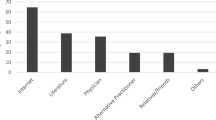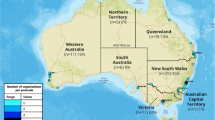Abstract
Purpose
Complementary medicine (CM) use is prevalent among cancer patients, yet it is often not assessed by oncology healthcare providers (HCPs). The purpose of this study was to evaluate oncology HCPs’ knowledge, attitudes, and practices surrounding CM use before and after the implementation of a practice guideline focusing on standardizing assessment and documentation of CM.
Methods
Oncology HCPs across a provincial cancer agency were invited to participate in the study. The implementation strategy included an initial education session for HCPs and standardized CM assessment forms. Pre-post surveys assessing knowledge, attitudes, and practices related to CM were completed by HCPs prior to attending the education session and following the 4-month implementation period. Paired t-tests were conducted to determine differences between baseline and follow-up surveys.
Results
A total of 31 oncology HCPs completed both baseline and follow-up surveys, with over 3700 patient CM assessment forms being completed during the 4-month study period. At the end of the study, HCPs reported greater CM knowledge (p < 0.001), readiness to support cancer patients’ CM decisions (p = 0.002), and willingness to consult with another HCP about CM (p = 0.004). No significant change in HCPs’ reported attitudes towards CM, or other clinical practices related to CM were observed.
Conclusion
Implementing a practice guideline, including a CM education session and a standardized assessment form, was found to improve oncology HCPs’ self-reported CM knowledge and readiness to answer cancer patients’ questions about CM. The findings provide support for future knowledge translation research aimed at standardizing how CM is addressed within cancer care settings.


Similar content being viewed by others
Data Availability
Data is stored in a University of Manitoba private server and can be made available upon request.
Code availability (software application or custom code)
All analyses were conducted using Stata 15.1, and code can be made available upon request.
References
National Centre for Complementary and Integrative Health. Complementary, alternative, or integrative health: What's in a name https://www.nccih.nih.gov/health/complementary-alternative-or-integrative-health-whats-in-a-name. Accessed 24 Nov 2020
Horneber M, Bueschel G, Dennert G et al (2012) How many cancer patients use complementary and alternative medicine: a systematic review and metaanalysis. Integr Cancer Ther 11:187–203. https://doi.org/10.1177/1534735411423920
Judson PL, Abdallah R, Xiong Y et al (2017) Complementary and alternative medicine use in individuals presenting for care at a comprehensive cancer center. Integr Cancer Ther 16:96–103. https://doi.org/10.1177/1534735416660384
Lyman GH, Greenlee H, Bohlke K et al (2018) Integrative therapies during and after breast cancer treatment: ASCO endorsement of the SIO clinical practice guideline. J Clin Oncol 36:2647–2655. https://doi.org/10.1200/JCO.2018.79.2721
Smith PJ, Clavarino AM, Long JE et al (2016) Complementary and alternative medicine use by patients receiving curative-intent chemotherapy. Asia Pac J Clin Oncol 12:265–274. https://doi.org/10.1111/ajco.12490
Huebner J, Marienfeld S, Abbenhardt C et al (2014) Counseling patients on cancer diets: a review of the literature and recommendations for clinical practice. Anticancer Res 34:39
Tascilar M, de Jong FA, Verweij J, Mathijssen RHJ (2006) Complementary and alternative medicine during cancer treatment: beyond innocence. Oncologist 11:732–741
Werneke U, Earl J, Seydel C et al (2004) Potential health risks of complementary alternative medicines in cancer patients. Br J Cancer 90:408–413
Clairet AL, Boiteux-Jurain M, Curtit E, et al (2019) Interaction between phytotherapy and oral anticancer agents: prospective study and literature review. Med Oncol 36:45. https://doi.org/10.1007/s12032-019-1267-z
Schofield P, Diggens J, Charleson C et al (2010) Effectively discussing complementary and alternative medicine in a conventional oncology setting: communication recommendations for clinicians. Patient Educ Couns 79:143–151. https://doi.org/10.1016/j.pec.2009.07.038
Thomson P, Jones J, Evans JM, Leslie SL (2012) Factors influencing the use of complementary and alternative medicine and whether patients inform their primary care physician. Complement Ther Med 20:45–53. https://doi.org/10.1016/j.ctim.2011.10.001
Balneaves LG, Truant TLO, Verhoef MJ et al (2012) The Complementary Medicine Education and Outcomes (CAMEO) program: a foundation for patient and health professional education and decision support programs. Patient Educ Couns 89:461–466. https://doi.org/10.1016/j.pec.2012.01.005
Davis EL, Oh B, Butow PN et al (2012) Cancer patient disclosure and patient-doctor communication of complementary and alternative medicine use: a systematic review. Oncologist 17:1475–1481. https://doi.org/10.1634/theoncologist.2012-0223;10.1634/theoncologist.2012-0223
Lee RT, Barbo A, Lopez G et al (2014) National survey of US oncologists’ knowledge, attitudes, and practice patterns regarding herb and supplement use by patients with cancer. J Clin Oncol 32:4095–4101. https://doi.org/10.1200/JCO.2014.55.8676
Roter D, Yost K, O’Byrne T et al (2016) Communication predictors and consequences of complementary and alternative medicine (CAM) discussions in oncology visits. Patient Educ Couns 99:1519–1525. https://doi.org/10.1016/j.pec.2016.06.002
Güthlin C, Holmberg C, Klein G (2016) Oncologists’ experiences of discussing complementary and alternative treatment options with their cancer patients. A qualitative analysis Support Care Cancer 24:3857–3862. https://doi.org/10.1007/s00520-016-3205-3
Stan DL, Wahner-Roedler DL, Yost KJ et al (2018) Absent and discordant electronic health record documentation of complementary and alternative medicine in cancer care. J Altern Complement Med 24:988–995. https://doi.org/10.1089/acm.2018.0141
Klein GE, Guethlin C (2018) Information and training needs regarding complementary and alternative medicine: a cross-sectional study of cancer care providers in Germany. Integr Cancer Ther 17:380–387. https://doi.org/10.1177/1534735416666372
Richardson MA, Mâsse LC, Nanny K, Sanders C (2004) Discrepant views of oncologists and cancer patients on complementary/ alternative medicine. Support Care Cancer 12:797–804. https://doi.org/10.1007/s00520-004-0677-3
Hessig RE, Arcand LL, Frost MH (2004) The effects of an educational intervention on oncology nurses’ attitude, perceived knowledge, and self-reported application of complementary therapies. Oncol Nurs Forum 31:71–78
Wahner-Roedler DL, Vincent A, Elkin PL et al (2006) Physicians’ attitudes toward complementary and alternative medicine and their knowledge of specific therapies: a survey at an academic medical center. Evidence-Based Complement Altern Med 3:495–501. https://doi.org/10.1093/ecam/nel036
Admi H, Eilon-Moshe Y, Ben-Arye E (2017) Complementary medicine and the role of oncology nurses in an acute care hospital: the gap between attitudes and practice. Oncol Nurs Forum 44:553–561. https://doi.org/10.1188/17.ONF.553-561
Chang KH, Brodie R, Choong MA et al (2011) Complementary and alternative medicine use in oncology: a questionnaire survey of patients and health care professionals. BMC Cancer 11:196. https://doi.org/10.1186/1471-2407-11-196
Ben-Arye E, Shulman B, Eilon Y et al (2017) Attitudes among nurses toward the integration of complementary medicine into supportive cancer care. Oncol Nurs Forum 44:428–434. https://doi.org/10.1188/17.ONF.428-434
Harnett J, Le TQ, Smith L, Krass I (2017) Perceptions, opinions and knowledge of pharmacists towards the use of complementary medicines by people living with cancer. Int J Clin Pharm 40:1272–1280. https://doi.org/10.1007/s11096-018-0645-5
Roberts CS, Baker F, Hann D et al (2008) Patient-physician communication regarding use of complementary therapies during cancer treatment 23:35–60. https://doi.org/10.1300/J077v23n04
Gall A, Anderson K, Adams J, et al (2019) An exploration of healthcare providers’ experiences and perspectives of traditional and complementary medicine usage and disclosure by Indigenous cancer patients. BMC Complement Altern Med 19:259. https://doi.org/10.1186/s12906-019-2665-7
Balneaves LG, Watling CZ, Hayward EN et al (2021) Addressing complementary and alternative medicine ase among individuals with cancer: an integrative review and clinical practice guideline. J Natl Cancer Inst. https://doi.org/10.1093/jnci/djab048
Brazier ASA, Balneaves LG, Seely D et al (2008) Integrative practice of Canadian oncology health professionals. Curr Oncol 15:S87
King N, Balneaves LG, Levin GT et al (2015) Surveys of cancer patients and cancer health care providers regarding complementary therapy use, communication, and information needs. Integr Cancer Ther 14:515–524. https://doi.org/10.1177/1534735415589984
Gruppen L, Benn R, White C, Fantone J, Smith K, Warber S (2013) Psychometric characteristics of an attitude instrument for complementary and alternative medicine. Paper presented at: Research in Medical Education (RIME) Conference; November 7–12, 2003; Washington, DC
Hsiao AF, Hays RD, Ryan GW et al (2005) A self-report measure of clinicians’ orientation toward integrative medicine. Health Serv Res 40:1553–1569. https://doi.org/10.1111/j.1475-6773.2005.00425.x
Delaney LJ, Manley SJ (2019) Complementary and alternative therapy use in a regional radiation oncology treatment centre: can staff knowledge, views, confidence and documentation be improved? J Med Radiat Sci 66:191–199. https://doi.org/10.1002/jmrs.344
Conrad AC, Muenstedt K, Micke O et al (2014) Attitudes of members of the German Society for Palliative Medicine toward complementary and alternative medicine for cancer patients. J Cancer Res Clin Oncol 140:1229–1237. https://doi.org/10.1007/s00432-014-1656-9
Ben-Arye E, Frenkel M, Bar-Sela G et al (2008) Teaching complementary medicine at an academic oncology department. J Cancer Educ 23:46–50. https://doi.org/10.1080/08858190701821261
Broom A, Adams J (2009) Oncology clinicians’ accounts of discussing complementary and alternative medicine with their patients. Health 13:317–336. https://doi.org/10.1177/1363459308101806
Ben-Arye E, Schiff E, Zollman C, et al (2013) Integrating complementary medicine in supportive cancer care models across four continents. Med Oncol 30:511. https://doi.org/10.1007/s12032-013-0511-1
Klein E, Beckmann MW, Bader W et al (2017) Gynecologic oncologists’ attitudes and practices relating to integrative medicine: results of a nationwide AGO survey. Arch Gynecol Obstet 296:295–301. https://doi.org/10.1007/s00404-017-4420-y
Rojas-Cooley MT, Grant M (2009) Complementary and alternative medicine: oncology nurses’ knowledge and attitudes. Oncol Nurs Forum 36:217–224. https://doi.org/10.1188/09.ONF.217-224
River J, McKenzie H, Levy D et al (2018) Convergent priorities and tensions: a qualitative study of the integration of complementary and alternative therapies with conventional cancer treatment. Support Care Cancer 26:1791–1797. https://doi.org/10.1007/s00520-017-4021-0
Tovey P, Broom A (2007) Oncologists’ and specialist cancer nurses’ approaches to complementary and alternative medicine and thier impact on patient action. Soc Sci Med 64:2550–2564. https://doi.org/10.1016/j.socscimed.2007.02.010
Acknowledgements
This manuscript was part of a capstone project submitted to the Faculty of Graduate Studies of the University of Manitoba in partial fulfillment of the requirements for the degree of Master of Physician Assistant Studies. We would like to acknowledge the following individuals for their assistance with this project: Dr. Tracy Truant, Dr. Antony Porcino, Ms. Brenda Ross, and Ms. Jill Taylor-Brown. We would also like to thank the healthcare professionals who took part in this study and all CancerCare Manitoba staff that helped facilitate this study.
Funding
This study was funded by the Canadian Cancer Society Research Institute Knowledge to Action grant program (#702660).
Author information
Authors and Affiliations
Contributions
Conceptualization: LGB conceptualized the study. Methodology: All authors contributed to formal analysis and investigation. CZW entered, cleaned, and analyzed the data. Writing: All authors wrote, reviewed, edited, and approved the final version of the manuscript. Funding acquisition: LGB secured funding for the study. Supervision: LGB and CZW provided supervision for the study.
Corresponding author
Ethics declarations
Ethics approval
All procedures performed in studies involving human participants were in accordance with the ethical standards of the institutional and/or national research committee and with the 1964 Helsinki Declaration and its later amendments or comparable ethical standards. The study was approved by the University of Manitoba Health Research Ethics Board (HS17924/ H2014:417) and the CancerCare Manitoba Research Resource Impact Committee (RRIC # 2017–36).
Consent to participate
All participants provided informed consent at recruitment of the study.
Consent for publication
Participants consented to have non-identifying information published.
Competing interest
The authors declare no competing interests.
Additional information
Publisher’s note
Springer Nature remains neutral with regard to jurisdictional claims in published maps and institutional affiliations.
Supplementary Information
Below is the link to the electronic supplementary material.
Rights and permissions
About this article
Cite this article
Hayward, E.N., Watling, C.Z. & Balneaves, L.G. A pre-post evaluation of oncology healthcare providers’ knowledge, attitudes, and practices following the implementation of a complementary medicine practice guideline. Support Care Cancer 29, 7487–7495 (2021). https://doi.org/10.1007/s00520-021-06318-2
Received:
Accepted:
Published:
Issue Date:
DOI: https://doi.org/10.1007/s00520-021-06318-2




